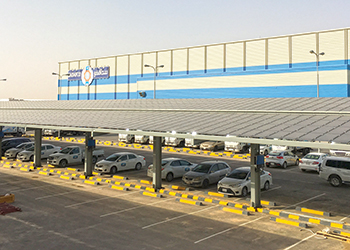
 Over 2,000 solar cells have been installed atop the carport.
Over 2,000 solar cells have been installed atop the carport.
Saudia Dairy and Foodstuff Company (Sadafco) has started using a photovoltaic (PV)-diesel hybrid system at its Riyadh Regional Distribution Centre (RDC) that can deliver up to 40 per cent of the facility’s daytime energy requirements.
The solar power project was undertaken at an investment of SR2 million ($530,000) and will help the company reduce its carbon footprint and save money.
“We are excited that the Riyadh RDC Solar Project is operational as it is a huge step towards becoming more sustainable,” said CEO Wout Matthijs. “We are looking forward to finding new ways to become more efficient and applying these learnings to other areas in which Sadafco operates. This is not just about powering our business, but reducing our operation’s carbon footprint in a way that is socially responsible.”
Covering a surface area of about 1,600 sq m, over 2,000 solar cells have been installed atop the carport structures in the parking area offering the additional benefit of sun shade for cars.
The project uses high-performance thin film photovoltaic modules from US-headquartered First Solar. These modules deliver more energy than conventional crystalline silicon panels, in the hot, humid and dusty conditions experienced in the greater part of Saudi Arabia. The hybrid system will not only result in cost savings from reduced diesel consumption on the generators necessary for an off-the-grid facility, but will decrease pollution as well.
“Furthermore, Sadafco will utilise the most eco-efficient solar technology as it generates 226 kW of power from the sun and combines it with output of existing diesel generators,” added Matthjis.
The project was executed on engineering, procurement and construction (EPC) terms by National Solar Systems, Saudi Arabia’s leading solar system integrator which has a long record of successful solar installations through the kingdom since 2004.
“The uniqueness of the RDC installation is that it has a hybrid diesel-solar configuration, which is the most complicated form of solar projects,” commented Abdulhadi Al-Mureeh, founder and CEO of National Solar Systems.
“It utilises fuel saver technology that reduces diesel consumption through advanced control algorithms between the solar energy output and the diesel generators.”

















.jpg)













 (1).jpg)













































